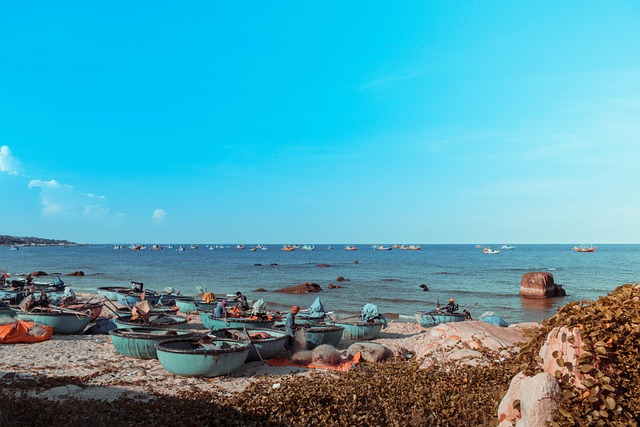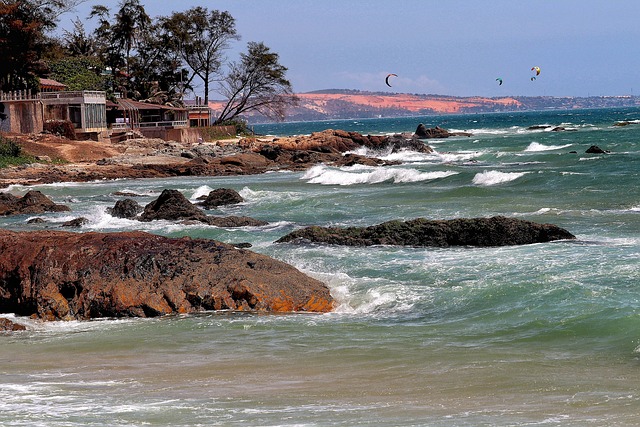Cập nhật: 01-01-1970 12:00:00 | Blogs about Vietnam | Lượt xem: 1231
From a desolate strip of coastline with huge dunes and a few small fishing villages, the coastal town of Mui Ne has gradually transformed into a vibrant and beloved destination in numerous Vietnam beach tours lately. This alluring spot wins hearts with its wind-swept landscapes, unique geological features, laid-back charm, and thriving cultural scene. If you’re looking for a memorable seaside escape in Southern Vietnam, Mui Ne guarantees a once-in-a-lifetime experience.
Mui Ne is a cape and tourism area in Phan Thiet City, Binh Thuan Province, Vietnam. It is located 22 km northeast of the city center on Vietnam’s southern coast and covers an area of 35.41 km². Apart from pristine beaches, Mui Ne is also appreciated for its distinctive white and red dunes, an awe-inspiring feature you can’t find anywhere else in the country. Additionally, warm weather and steadily strong winds have made this a popular surfing hub among adventure junkies, both locals and expats.

Mui Ne Vietnam features a year-round warm climate with average annual temperatures of 25°C - 26°C, which means it can be visited at any time. However, the better period for your trip is during its dry season (November-April). This season comes with sunny weather and consistent winds, creating perfect conditions for outdoor activities, especially wind-based ones like kite surfing and sailing. The rainy season (May - October) is less ideal due to the high chances of sudden showers, but it is less crowded and generally offers a more tranquil experience.
Mui Ne is mostly reached from Ho Chi Minh City, the largest metropolis in Southern Vietnam. The land drive from Ho Chi Minh City to Mui Ne takes around 5 hours. There are also buses from nearby hubs like Nha Trang or Da Lat, with equivalent durations and prices.
Another common option to travel from Ho Chi Minh City to Mui Ne is by 4-hour train ride. This scenic train ride will take you to Phan Thiet Station, which is about 30 km from Mui Ne.
For thrill-seekers, riding to Mui Ne is also a fantastic choice. You can easily rent a motorbike or car in Saigon and drive along the coastline to your destination at your own pace. The total distance would be about 230 km.
The best way to roam Mui Ne is on a scooter, which can be rented conveniently. Some hotels even provide bicycles for free or at a low cost if you prefer pedaling around. For further destinations, keep in mind that taxis usually hang out near big resorts. And, if you’re all about seeing the sights, Jeep Adventure is an exciting experience.
Although Mui Ne is quite small, it still has a wide variety of accommodations that suit different styles and budgets, from affordable homestays to high-end hotels and resorts. Whereas most homestays are not close to the beach, they offer cozy spaces and culturally rich experiences. Mid-range hotels are scattered throughout the area, most abundantly on the bustling Nguyen Dinh Chieu and Huynh Thuc Khang Streets.
If you’re aiming for a true coastal getaway, beachfront resorts are your best fit. Resorts here are mostly four and five-star, providing modern amenities, top-notch services, and breathtaking ocean views.

Undoubtedly, the dunes are Mui Ne’s most striking and iconic feature. There are two prominent spots of dunes you can’t miss in this place, both named after their characteristic shades: the Red Dunes and the White Dunes. Located closer to the town, the Red Dunes are smaller but offer a tepid, fiery landscape that’s incredibly stunning at sunrise and sunset. Sandboarding is the most fun thing you can try here, which lets you slide down steep dunes.
The White Dunes, on the other hand, are a bit further, but larger and way more dramatic. A quad bike might help with traversing its expansive terrain. Not an active traveler? You can simply stroll along the dunes and enjoy the awe-inspiring vista. It’s recommended to plan your visit here early mornings or late afternoons to avoid the heat and crowds, especially in the summer months.
Located at Mui Ne Harbor in the northern part of Mui Ne Beach, the fishing village offers a fantastic insight into this land’s traditional lifestyle as well as its past as a fishing outpost. At the crack of dawn, hundreds of brightly colored boats bob around in the water, and many fishermen speedily unload their catch with crates and trolleys for selling or trading with others. This village is also an amazing place for sampling fresh seafood like crab, shrimp, squid, or octopus... You can enjoy them grilled or steamed right at the spot, or ask the locals to clean and boil them with a little extra fee before bringing them back to savor later.
Not far away from the fishing village is the Fairy Stream, a surreal natural attraction where a shallow waterway runs between gorgeous red-orange sand cliffs on one side and a lush green jungle on the other side, forming a vivid contrast. This stream stretches for 1.8 km and is only ankle-deep, so feel free to take off your shoes and wade through the cool water. Its surrounding landscape is also peacefully enchanting, perfect for photography and a leisurely walk.
Of course, you can’t visit a coastal town without checking out its beaches. There are a few lovely shorefronts that promise quality beach time here, most typically Mui Ne Beach, Hon Rom Beach, Ong Dia Beach, and Bai Rang Beach, all offering picturesque beauty and serene ambiance. The golden sand, crystal-clear water, and gentle breeze make them idyllic locations for sunbathing and relaxation with a refreshing glass of coconut juice in your hand.

Mui Ne’s constant strong wind and clear waters have turned it into an amazingly celebrated destination for water sports like kitesurfing or windsurfing. Don’t worry if you’re not a pro, there are plenty of schools and rental shops along the beach that will help you get started at really competitive prices.
For a slice of local culture, don’t forget to visit Po Sah Inu, a group of Hindu temple relics of the Champa Kingdom situated approximately 20 km from Mui Ne. Constructed in the late 8th and early 9th centuries, these towers aren’t impressive in size but brightly reflect the quintessence of ancient Cham’s architectural techniques and decorative arts. Many documents state that there was once a much larger tower alongside the three ones we see today, but for some reason, it was buried under the ground about 300 years ago. Despite all that, Po Sah Inu is still one of Vietnam’s most well-preserved Cham relics.

Essentials Tours - 4 days 3 nights

Essentials Tours - 14 days 13 nights

Essentials Tours - 12 days 11 nights















